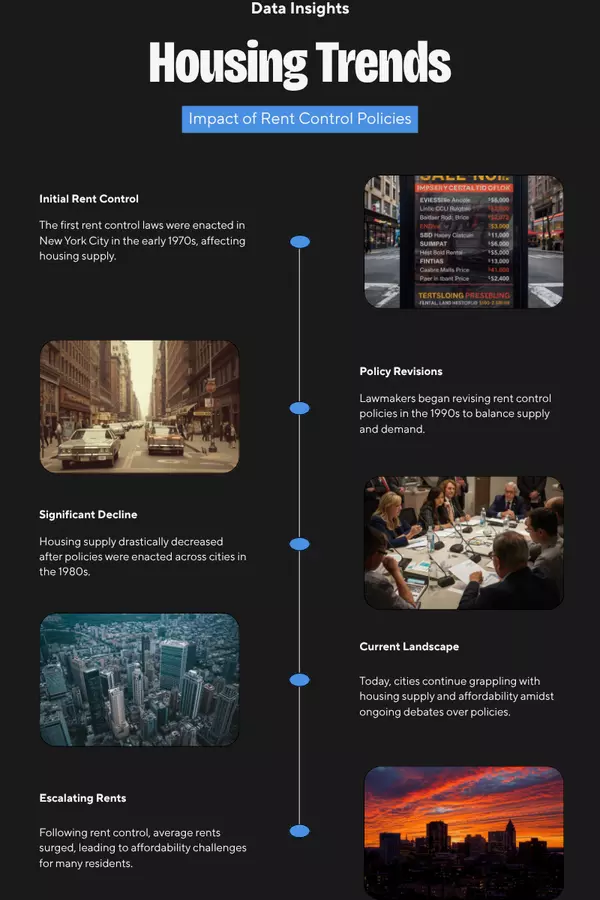The Real Cost of Rent Control in Massachusetts — And Better Alternatives
The Real Cost of Rent Control in Massachusetts — And Better Alternatives
As discussions heat up across the Commonwealth about enacting rent control, it’s critical we look at what this really means for homeowners, investors, and the housing market in Greater Boston. The idea might feel appealing—“lock in rents, protect tenants”—but the unintended consequences are real, well documented, and costly based on very public evidence from many other cities nationally and globally.
As someone deeply invested in the Boston‑area real estate market (as a broker and investor), I believe in free markets, strong supply, and smart policy. I also believe in helping homeowners and investors navigate change—and not be caught off‑guard.
Here’s what you need to know, what the data from other markets shows, why I oppose rent control, and what we should do instead to improve housing affordability in Massachusetts.
What the Proposed Rent Control Bill Would Do
While details vary depending on the final language, here are the common elements of the rent‑control proposals under discussion:
-
Give municipalities (cities or towns) the power to cap annual rent increases for certain residential units.
-
Possibly limit “vacancy resets” — i.e., how much rent can be increased when a unit turns over to a new tenant.
-
Impose rent‑increase ceilings tied to a formula (e.g., CPI + X% or fixed percentage).
-
Expand tenant protections (eviction “for cause”, longer notice‑periods, stronger enforcement).
-
Potentially exclude newly constructed units, but many proposals make exemptions narrow.
-
Meet local housing affordability goals by limiting rent escalations.
In Massachusetts, rent control has been repealed since 1994 statewide. Any new law would require either a change in state law or local “home‑rule”petitions by municipalities with legislative approval.
What the Empirical Research & Case Studies Show
Let’s get into the data. Rent control is often well‑intentioned. But the academic evidence and practical outcomes consistently show a pattern of side effects.
Rental Supply Declines
-
A review by the Brookings Institution found that while rent‑control policies help current tenants in the short run, they lead to decreased supply, buildings being converted out of rental, fewer new units over time. Brookings
-
The Urban Institute found in their 2024 study that “rent control is associated with a reduction in the total number of units in a city.” Urban Institute
-
One study found that in rent‑controlled jurisdictions, landlords cut back on maintenance and conversion to higher‑end uses, reducing rental stock by ~15%. ScienceDirect
Distorted Incentives & Inequitable Outcomes
-
The Association of Real Estate License Law Officials / housing‑provider data indicate: “67% of housing providers say they would absolutely not invest in another market with rent control.” NAAHQ
-
One central critique: subsidies are based on tenancy (who happened to be in the unit), not on income or need — that means higher‑income tenants benefit simply because they were first in.
-
In Massachusetts during past rent control years, about 30% of rent‑controlled apartments were occupied by households in the upper half of the income distribution, undermining the goal of targeting affordability in the first place. MassLandlords
Localized Case: Massachusetts
-
In cities like Cambridge, Massachusetts, when rent control was repealed in 1994, new housing and construction rose by 50% within four years, and property values increased by about $7.8 billion in the decade following the repeal (approx $3 billion in 2024 dollars attributed to the repeal) according to independent research.
-
During the rent‑control era in MA, units weren’t well maintained, and many landlords found the regime economically unviable.
Long‑Term Market Effects
-
A 2024 study in “What Are the Long‑run Trade‑offs of Rent‑Control Policies?” found the long‑run effects include: fewer rental units, disincentive to invest, deteriorating housing stock, and higher rents for non‑controlled units. St. Louis Fed
-
The broader global data (e.g., French cities) show that while median rents may slow, the number of available units drops sharply, and landlords shift to furnished or alternative uses not subject to control. Le Monde.fr
Why I Oppose Rent Control in Greater Boston
Here are the reasons I come down firmly against rent control — especially relevant for our market here in and around Boston.
1. We Already Face a Supply Shortage
In the Boston metro, we are fighting a structural housing‑supply deficit. Limiting landlord returns or rent increases in this context exacerbates the problem. If investors anticipate regulated returns, they withhold or reduce investment, making the supply issue worse — not better.
2. It Risks Fewer New Units & Lower Quality Stock
The research shows: when returns are capped, developers build less, existing owners defer maintenance or convert units, and over time the number and quality of rental units decline. Fewer units means higher pressure on the remaining ones — which means upward pressure on market rents elsewhere.
3. It Mis‑targets Help
Rent control treats all tenants in certain units the same, whether they need help or not. That’s not efficient. A middle‑class tenant in a rent‑controlled unit may benefit more than a lowerincome tenant in market‑rate housing. That’s not smart policy.
4. Reversal Is Extremely Hard
Once controls are in place, removing them is politically and practically very difficult. Massachusetts' own history shows this: when rent control existed, it dampened construction and depressed tax revenue. Repeal in 1994 helped restore the market. Unless we stop this early, we risk locking ourselves into sub‑optimal policy for decades.
5. It Doesn’t Fix the Root Cause
Rent control will slow rent growth but it doesn’t address why rents are high. Things like regulatory burdens, slow permitting, zoning limits, construction cost inflation, and limited land availability are the real drivers. Without addressing them, controls are just a temporary effort that likely won't actually fix anything.
What Can Massachusetts Do Instead? Smart, Market‑Driven Alternatives
I’m all for making housing more affordable—for renters and owners alike. But I believe the solutions should preserve incentives, encourage growth, and keep the market dynamic. Here are alternatives I’d push for:
• Increase Housing Supply
-
Streamline approvals and reduce red‑tape: cities and towns around Greater Boston NEED to expedite zoning changes, especially for multi‑family and mixed‑use housing in ALL locations.
-
Encourage accessory dwelling units (ADUs): allow homeowners to add units, convert basements, etc., to increase small‑scale rental inventory.
-
Incentivize Middle-Market new construction: tax credits, density bonuses, or other incentives for developers who build workforce housing or mixed‑income properties.
• Align Rent With Income (Not Just Arbitrary Caps)
-
Create tenant‑income–based subsidies or vouchers, targeted at lower‑income households, rather than applying one‑size‑fits‑all rent caps.
-
Expand programs that support low‑ and moderate‑income renters to be competitive in the market without distorting the entire rental stock.
• Protect Tenants While Preserving Investment
-
Enact just‑cause eviction protections, stronger landlord/tenant mediation, transparency in rent increases — without full price controls.
-
Encourage long‑term leasing models: e.g., longer‑term leases (2‑3 years) at predictable increases (tied to CPI) for residents who want stability.
• Encourage Responsible Landlord Practices
-
Provide local funding/grants for property maintenance and upgrades — particularly in older buildings — so landlords are incentivized to keep units safe, updated, and affordable.
-
Use tax‑abatements or credits for landlords who keep rents below a threshold and make significant improvements.
• Promote Ownership Opportunities
-
For renters who want to transition to buyers, continue creating non-inflationary first‑time‑buyer programs, down‑payment assistance, or partnerships converting rental stock to co‑ops or shared‐ownership models. A healthier pool of owner‐occupiers supports affordability.
• Regional Coordination & Data Transparency
-
Create a statewide rental data dashboard so policymakers, investors and communities can see supply, vacancy, rent trends in real time. Better data = better policy.
-
Encourage regional collaboration across Greater Boston municipalities to avoid “leap‑frog” effects where one town restricts and another sees the spill‐over.
Protect Supply. Encourage Growth. Be Smart.
I believe strongly that rent control is the wrong path for Massachusetts — especially in the Greater Boston market where supply is constrained and investment matters. The data show the risks: fewer units, lower investment, lower quality stock long-term, mis‑targeted benefits, and long‑term market distortion.
But the goal is right: make housing more affordable, make sure renters and owners both thrive, make our region attractive and sustainable. If we lean into smart, market‑friendly solutions—expanding supply, protecting tenants, targeting help where it’s needed—we can make progress without sacrificing the long‑term health of the housing market.
If you’re a homeowner, investor, or potential seller in the Boston area and want to understand how this all impacts your property or strategy, let’s talk. I can help you map out your options, understand potential policy changes, and plan accordingly.
Let’s keep BUILDING—not politically controlling!
Ed Gaeta
Gaeta Properties
Recent Posts









GET MORE INFORMATION

